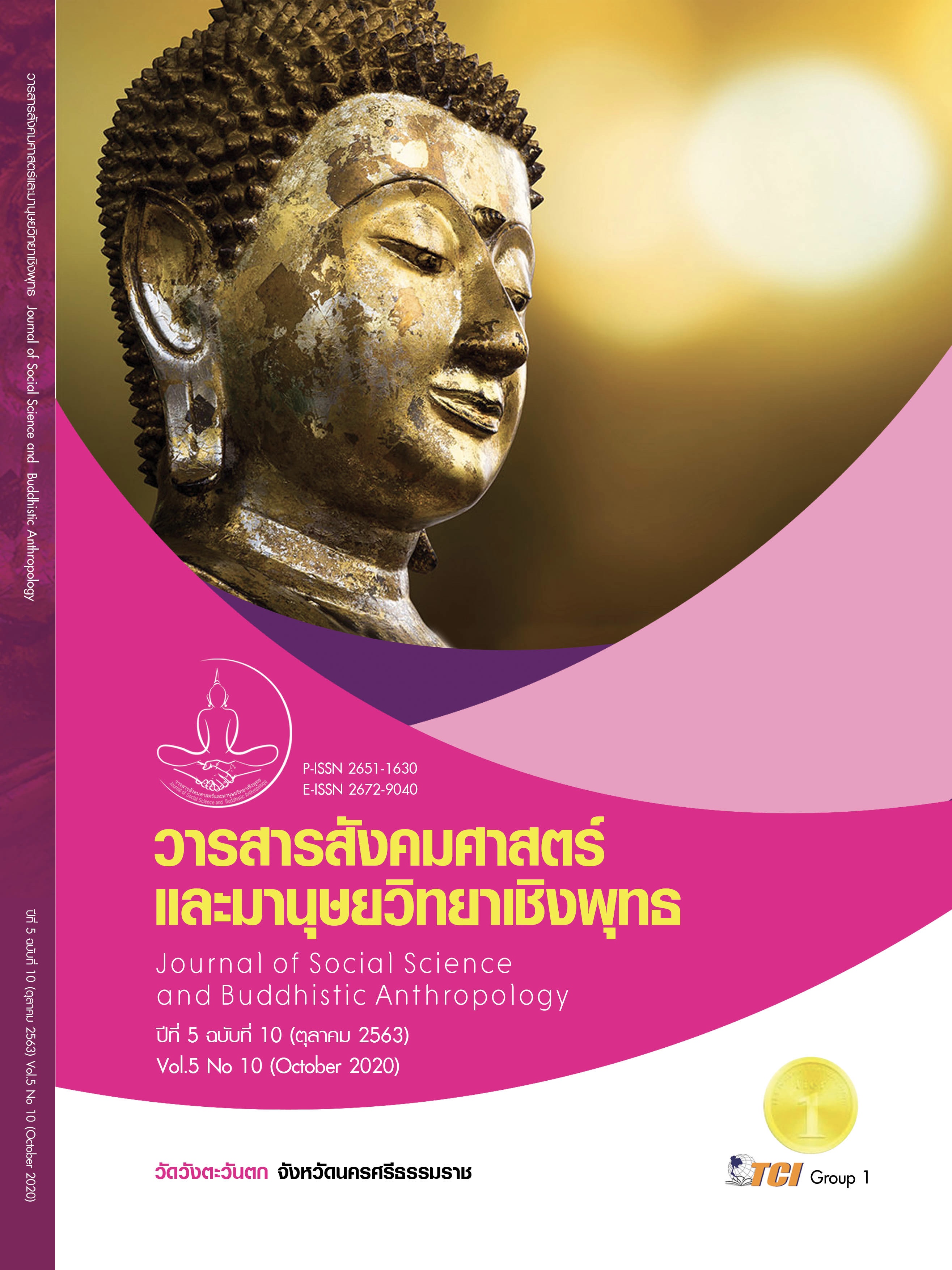THE HAPPINESS OF THE ELDERLY IN THE RURAL AREAS OF NAKHON RATCHASIMA PROVINCE
Keywords:
Happiness, Elderly, Rural AreaAbstract
The Objectives of this research article were to study the happiness level of the elderly, the factors that make the elderly happy, and ways to live a happy life of the elderly in the rural area of Nakhon Ratchasima Province. The subjects were 400 elderly, which were obtained by the multistage sampling method. The research instrument was a questionnaire that was approved for content validity and reliability (IOC = .66 - 1.00, Cronbach’s alpha coefficient = .74). Data were analyzed for frequency distribution, percentage, mean, standard deviation and content analysis. The results showed that the elderly felt the highest level of happiness on were having a good relationship with their neighbors, followed by ensuring that the residential community is security, and being able to help others solve problems, respectively. The factors that make the elderly the happiest included going to the temple, listening to the Dharma, making merit, praying to the monks, followed by happiness from being with family and grandchildren, and being happy with work, respectively. As for the ways to live a happy life, most elderly had suggested that one should behave as a good person, namely, be honest, grateful, humble, respectful and disciplined in life, followed by diligence, determination to work, and keep on seeking knowledge, because knowledge is an important cost for making a career and earning, respectively. Based on the findings of the happiness of the elderly, it is suggested that, in order for the elderly to live happily, family members play an important role. They should give time and take care of the elderly with understanding. Society should provide opportunities for the elderly to work according to their potential, have a market to support the product to increase income, as well as encourage the elderly to participate in various activities, to create pride and feel valuable.
References
กรมกิจการผู้สูงอายุ. (2560). ชุดความรู้การดูแลตนเองและพัฒนาศักยภาพผู้สูงอายุ “สุขภาพดี”. กรุงเทพมหานคร: กระทรวงการพัฒนาสังคมและความมั่นคงของมนุษย์.
ขวัญสุดา บุญทศ และขนิษฐา นันทบุตร. (2560). ความสุข ความทุกข์ และสุขภาพจิตผู้สูงอายุในชุมชนแห่ง หนึ่งในภาคเหนือตอนบน ประเทศไทย. วารสารสมาคมจิตแพทย์แห่งประเทศไทย, 62(3), 257-270.
จิตติยา สมบัติบูรณ์ และคณะ. (2562). ความสุขของผู้สูงอายุไทยในยุค Thailand 4.0. วารสารวิทยาลัยพยาบาลพระปกเกล้า จันทบุรี, 30(2), 219-228.
ปราโมทย์ ประสาทกุล. (2559). สถานการณ์ผู้สูงอายุไทย พ.ศ. 2558. กรุงเทพมหานคร: อมรินทร์พริ้นติ้งแอนด์พับลิชชิ่ง.
ปิยวัฒน์ เกตุวงศา และคณะ. (2559). ความอยู่ดีมีสุขของครัวเรือนชนบทไทยภายใต้การเปลี่ยนแปลงทาง ประชากรและสังคม. นครปฐม: สถาบันวิจัยประชากรและสังคม มหาวิทยาลัยมหิดล.
ภักศจีภรณ์ ขันทอง และคณะ. (2560). ความสุขและความพึงพอใจในชีวิตของผู้สูงอายุในตำบลหนองขอน อำเภอเมือง จังหวัดอุบลราชธานี. วารสารหมอยาไทยวิจัย, 3(2), 7-15.
พระมหายศวิภรณ์ เปมสีโลโร และคณะ. (2561). การบูรณาการหลักฆราวาสธรรมกับการปฏิบัติตนของครอบครัวไทยยุคไทยแลนด์ 4.0. วารสารสังคมศาสตร์และมานุษยวิทยาเชิงพุทธ, 3(2), 44-62.
พระวงศ์สรสิทธิ์ รติกโร และคณะ. (2561). คุณค่าของการสวดมนต์ที่มีต่อพุทธศาสนิกชนไทย: กรณีศึกษา สำนักปู่สวรรค์. วารสารสังคมศาสตร์และมานุษยวิทยาเชิงพุทธ, 3(2), 79-94.
พัชรี คมจักรพันธุ์. (2556). ครอบครัวกับการสร้างเสริมพฤติกรรมสุขภาพผู้สูงอายุ. วารสารสงขลานครินทร์ ฉบับสังคมศาสตร์และมนุษยศาตร์, 19(3), 229-253.
รักชนก ชำนาญมาก และคณะ. (2561). องค์ประกอบความสุขของผู้สูงอายุในชนบทภาคตะวันออกเฉียงเหนือ: พลวัตการเปลี่ยนแปลงทางสังคมในกระแสโลกาภิวัตน์. วารสารมนุษยศาสตร์ สังคมศาสตร์ มหาวิทยาลัยขอนแก่น, 35(2),90-116.
วรรณวิสาข์ ไชยโย. (2555). ทรรศนะเรื่องความสุขในผู้สูงอายุ: กรณีศึกษาบ้านวัยทองนิเวศน์. มนุษยศาสตร์สาร, 13(1), 16-30.
วรรณวีร์ บุญคุ้ม และคณะ. (2561). การพัฒนาทักษะการเรียนรู้อย่างสร้างสรรค์แบบองค์รวมสำหรับ ผู้สูงอายุในชนบทไทย: ด้านอาชีพ. วารสารสังคมศาสตร์บูรณาการ, 5(1), 3-29.
วิรดา อรรถเมธากุล และวรรณี ศรีวิลัย. (2556). ปัจจัยที่ส่งผลต่อภาวะสุขภาพของผู้สูงอายุ ตำบลคูบัว จังหวัดราชบุรี. วารสารวิจัยทางวิทยาศาสตร์สุขภาพ, 7(2), 18-22.
ศุภเจตน์ จันทร์สาส์น. (2556). ความอยู่ดีมีสุขของผู้สูงอายุในครอบครัวสูงวัยในประเทศไทย. วารสารปัญญาภิวัฒน์, 4(2), 92-103.
สำนักกองทุนสนับสนุนการสร้างเสริมสุขภาพ. (2562). การสร้างความสุขในผู้สูงอายุ. เรียกใช้เมื่อ 5 มีนาคม 2563 จาก https://www.thaihealth.or.th
สำนักงานสถิติจังหวัดนครราชสีมา. (2560). รายงานสถิติจังหวัดนครราชสีมา พ.ศ. 2560. นครราชสีมา: สำนักงานสถิติจังหวัดนครราชสีมา.
สำนักงานสถิติแห่งชาติ. (2561). รายงานการสำรวจประชากรสูงอายุในประเทศไทย พ.ศ. 2560. กรุงเทพมหานคร: สำนักงานสถิติแห่งชาติ.
สำนักเลขานุการของคณะกรรมการยุทธศาสตร์ชาติ. (2561). ยุทธศาสตร์ชาติ พ.ศ. 2561-2580. กรุงเทพมหานคร: สำนักงานคณะกรรมการพัฒนาการเศรษฐกิจและสังคมแห่งชาติ.
สุรสิทธิ์ ไกรสิน. (2562). ผลกระทบของความเปลี่ยนแปลงของสถาบันครอบครัวที่มีต่อผู้สูงอายุในชนบทอีสาน. วารสารมหาวิทยาลัยมงกุฏราชวิทยาลัย วิทยาเขตร้อยเอ็ด, 8(1), 221-230.
เอื้อมพร หลินเจริญ. (2555). เทคนิคการวิเคราะห์ข้อมูลเชิงคุณภาพ. วารสารการวัดผลการศึกษา, 17(1), 17-29.
อภิชัย มงคล และคณะ. (2544). การศึกษาดัชนีชี้วัคสุขภาพจิตคนไทย. วารสารสมาคมจิตแพทย์แห่ง ประเทศไทย, 46(3), 209-225.
Guzman, J. M. et al. (2012). Ageing in the Twenty-First Century: A Celebration and A Challenge. New York: United Nations Population Fund.
Mantovani, E. P., et al. (2016). Associations Between Meanings of Old Age and Subjective Well-Being Indicated by Satisfaction Among the Elderly. Revista Brasileira de Geriatria e Gerontologia, 19(2), 203-222.
Mhaske, R. (2017). Happiness and Aging. Journal of Psychosocial Research, 12(1), 71-79.









